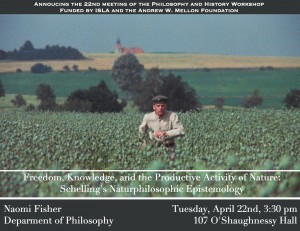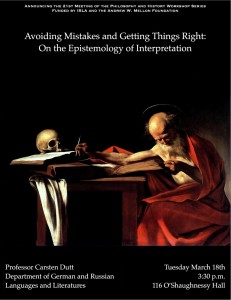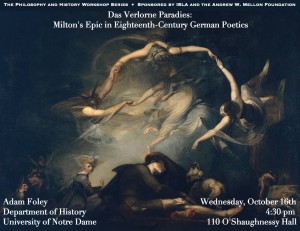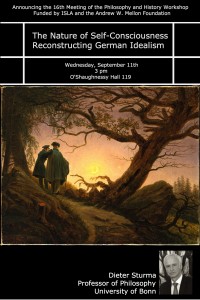We are happy to announce that Joshua Robinson will be giving a talk on Monday, April 7th at 3 pm in 107 O’Shaughnessy, entitled Emanation, Creation ex nihilo, or tertium quid?: Proclus, Nicholas of Methone, and Dionysius the Areopagite. The abstract can be found below.
Refreshments will be available. Hope you see you there!
—–
Nicholas of Methone’s 12th-century Refutation of Proclus’ Elements of Theologyconfronts Proclus’ doctrine of emanation, understood as the automatic and hierarchically mediated procession of all beings from the One, with the Christian doctrine of creation, understood as God’s freely willed and direct production of all beings “from not being.” In the service of his Refutation, Nicholas appeals repeatedly to Dionysius the Areopagite as one of his primary authorities, particularly in order to defend the doctrine of the Trinity by an appeal to apophatic theology, contending on the one hand that Proclus fails to recognize God’s transcendence and inaccessibility to understanding, and on the other hand that only the doctrine of creation and the causal transcendence it implies can ground a properly apophatic theology. Ironically, however, the stark opposition that Nicholas sees between Creation and Emanation is complicated precisely by Dionysius’ conception of God’s relation to the world, for while Dionysius agrees with Nicholas on the one hand in rejecting a hierarchy of mediating productive causes, on the other hand Dionysius is closer to Proclus (1) in employing emanative language (e.g. “procession”) for God’s causation of the world, (2) in making no mention at all of creation “from not being,” and (3) in saying, as Proclus does, that God produces the world “by mere being,” rather than insisting, as Nicholas does, that creation is a divinely willed act. Dionysius’ intermediate position between Proclus and Nicholas invites a reassessment of the often-presumed identification of Christian teaching with Creation ex nihilo and against Emanation. It would seem that either we must deny that Dionysius’ view is Christian, or we must be prepared to envision a Christian emanationism amongst the spectrum of possible views.


 We are pleased to announce a workshop by Adam Foley, from the History Department here at Notre Dame. The title of his talk is “Das Verlorne Paradies: Milton’s Epic in Eighteenth-Century German Poetics”. The workshop will take place on Wednesday, October 16th at 4:30 pm in 110 O’Shaughnessy Hall. Refreshments will be provided.
We are pleased to announce a workshop by Adam Foley, from the History Department here at Notre Dame. The title of his talk is “Das Verlorne Paradies: Milton’s Epic in Eighteenth-Century German Poetics”. The workshop will take place on Wednesday, October 16th at 4:30 pm in 110 O’Shaughnessy Hall. Refreshments will be provided.